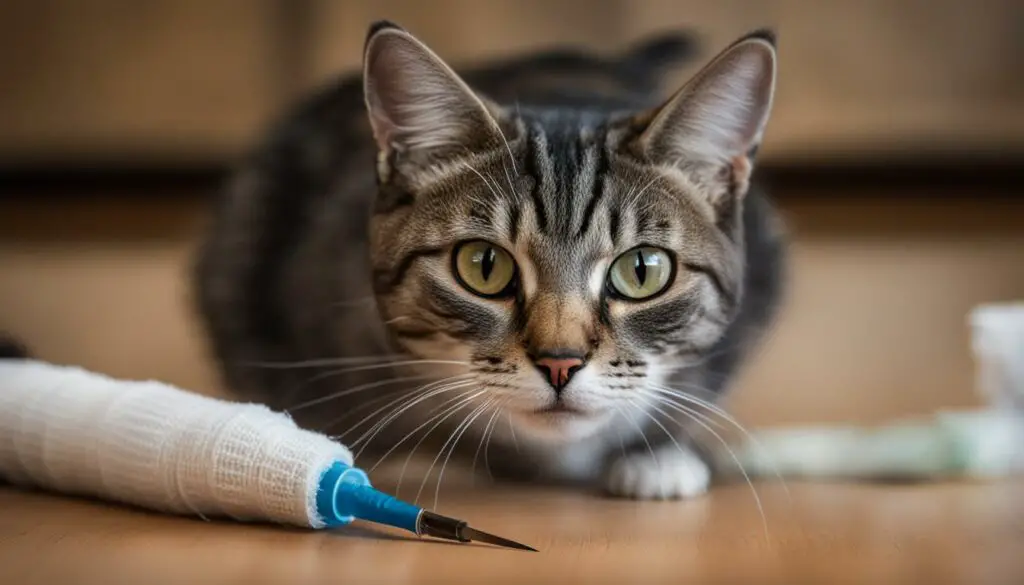Accidents happen, and sometimes our furry friends end up getting more than they need. If you find yourself in a situation where your cat accidentally receives two rabies shots, it’s important to understand the potential risks and take appropriate action.
Accidental double vaccination can potentially lead to mild to severe reactions in cats. From vomiting and swelling at the injection site to more serious complications like cancerous tumors or organ damage, it’s crucial to be aware of the signs and symptoms of a reaction.
Key Takeaways:
- Accidental double rabies vaccination can cause mild to severe reactions in cats.
- Signs of a reaction may include vomiting, swelling, fever, diarrhea, lethargy, and itching.
- Serious reactions can lead to cancerous tumors, organ damage, and anaphylactic shock.
- Rabies vaccination is required for all cats in most states and counties.
- Regular monitoring and immediate veterinary care are essential after potential exposure.
Signs of Mild Reaction or Allergy to the Rabies Vaccine
If you notice any unusual symptoms or changes in your cat after receiving the rabies vaccine, it could be indicative of a mild reaction or allergy. Some signs to look out for include vomiting, swelling at the injection site, pain at or near the injection site, low-grade fever, diarrhea, appetite loss, lethargy, itching, and sneezing. While these symptoms may be mild, it’s important to monitor your cat closely and consult with your veterinarian if you have any concerns.
A mild reaction to the rabies vaccine in cats is not uncommon. In most cases, these symptoms will resolve on their own within a few days. However, if your cat’s condition worsens or if you notice any severe symptoms, it’s crucial to seek veterinary care immediately. Remember, it’s always better to err on the side of caution when it comes to your cat’s health.
Recognizing Allergic Reactions
In rare cases, cats may experience an allergic reaction to the rabies vaccine. This can manifest in more severe symptoms such as difficulty breathing, facial swelling, hives, or collapse. If you observe any of these signs, it is an emergency, and you should seek immediate veterinary attention.
“It is important to closely monitor your cat after vaccination and report any unusual symptoms to your veterinarian. Early detection and proper medical intervention can help prevent any potential complications.”
While mild reactions or allergies to the rabies vaccine can occur, it’s important to remember that the benefits of vaccination far outweigh the risks. Rabies is a deadly disease that can be transmitted to humans and poses a significant public health risk. Keeping your cat up to date on their rabies vaccinations is not only crucial for their well-being but also for the safety of yourself, your family, and your community.
| Signs of Mild Reaction or Allergy to the Rabies Vaccine | Action |
|---|---|
| Vomiting, swelling at the injection site, pain at or near the injection site, low-grade fever, diarrhea, appetite loss, lethargy, itching, and sneezing. | Monitor your cat closely and observe for any worsening symptoms. Contact your veterinarian if concerned. |
| Difficulty breathing, facial swelling, hives, or collapse. | Seek immediate veterinary attention as these are signs of an allergic reaction. |
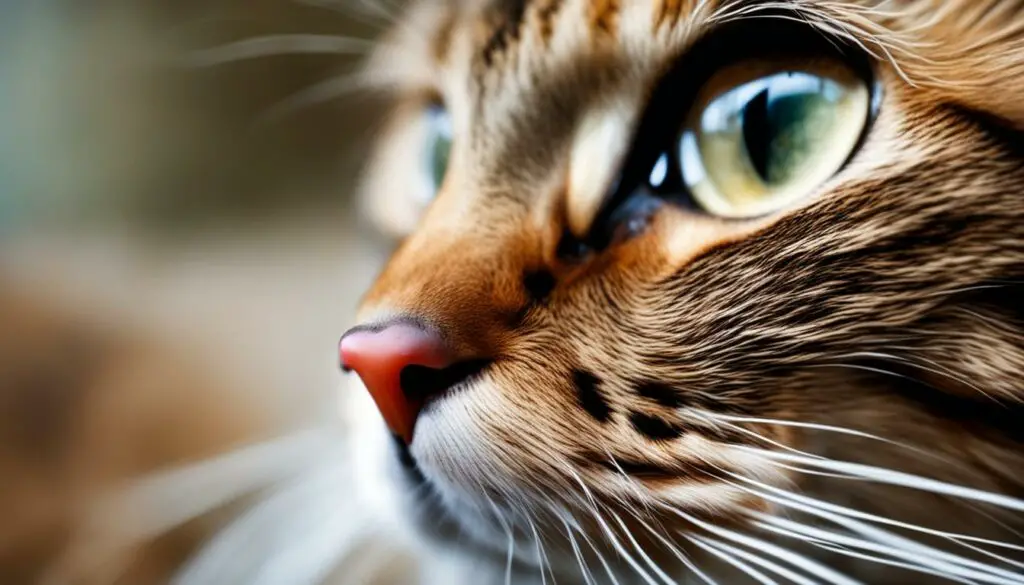
Signs of Serious Reaction to the Rabies Vaccine
While the rabies vaccine is an important and effective preventive measure for cats, it is essential to be aware of the signs of a serious reaction. Although such reactions are rare, it is crucial to seek veterinary care immediately if any of these symptoms occur after vaccination:
- Severe swelling at the injection site
- Difficulty breathing or wheezing
- Excessive salivation or drooling
- Seizures or tremors
- Extreme lethargy or weakness
- Uncontrolled vomiting or diarrhea
If your cat displays any of these symptoms, it may be experiencing a severe adverse reaction to the rabies vaccine. Prompt veterinary attention is crucial to alleviate discomfort and prevent further complications.
“Severe reactions to the rabies vaccine in cats can have potentially life-threatening consequences. Recognizing the signs and seeking immediate veterinary care is vital for your cat’s well-being.” – Dr. Emily Johnson, DVM
It is important to note that although serious reactions to the rabies vaccine can be alarming, they are rare. The benefits of rabies vaccination greatly outweigh the potential risks, as rabies is a deadly disease that can be transmitted to humans and other animals. Regular vaccination is the best way to protect both your cat and your family from this serious infection.
| Severity of Reaction | Symptoms |
|---|---|
| Mild | Vomiting, swelling or pain at the injection site, low-grade fever, diarrhea, appetite loss, lethargy, itching, sneezing |
| Serious | Severe swelling at the injection site, difficulty breathing, excessive salivation, seizures or tremors, extreme lethargy or weakness, uncontrolled vomiting or diarrhea |
Always consult with your veterinarian about any concerns or questions regarding your cat’s vaccination and any potential reactions. Your veterinarian is the best resource for guidance and advice tailored specifically to your cat’s needs.
Rabies Vaccination Requirements for Cats
Rabies vaccination is an essential requirement for all cats in most states and counties. The vaccination helps protect both cats and humans from the deadly rabies virus. It is crucial to understand the vaccination schedule and requirements for cats to ensure their well-being and compliance with local regulations.
Cat Vaccination Schedule
The first rabies vaccination for cats should be administered no later than four months after their date of birth. This initial vaccination provides the foundation for their immunity against the rabies virus. Booster shots are typically given within one year of the initial vaccination to further strengthen their immunity. These booster shots can last for up to three years, depending on the specific requirements and regulations in your area. It is important to consult with your veterinarian to determine the appropriate vaccination schedule for your cat.
Rabies Vaccine for Indoor Cats
Even if your cat is strictly indoors, it is still important to get them vaccinated against rabies. While indoor cats may have a lower risk of encountering animals carrying the virus, there are instances where they may accidentally escape or encounter wildlife. Vaccinating indoor cats not only protects them from potential exposure but also helps to prevent the transmission of rabies to humans and other animals in case of accidental bites or scratches. It is better to be safe and ensure your cat’s protection by keeping their rabies vaccinations up to date.
Exemptions for Rabies Vaccination
In some cases, exemptions may be granted for cats if the rabies vaccine would adversely affect their health. This can be particularly applicable to cats with certain underlying medical conditions or previous vaccine reactions. However, exemptions are typically granted on a case-by-case basis and require documentation from the cat’s veterinarian. Some areas may require approval from the local public health authority. It is important to check the specific requirements and regulations in your location to understand the process for obtaining an exemption.
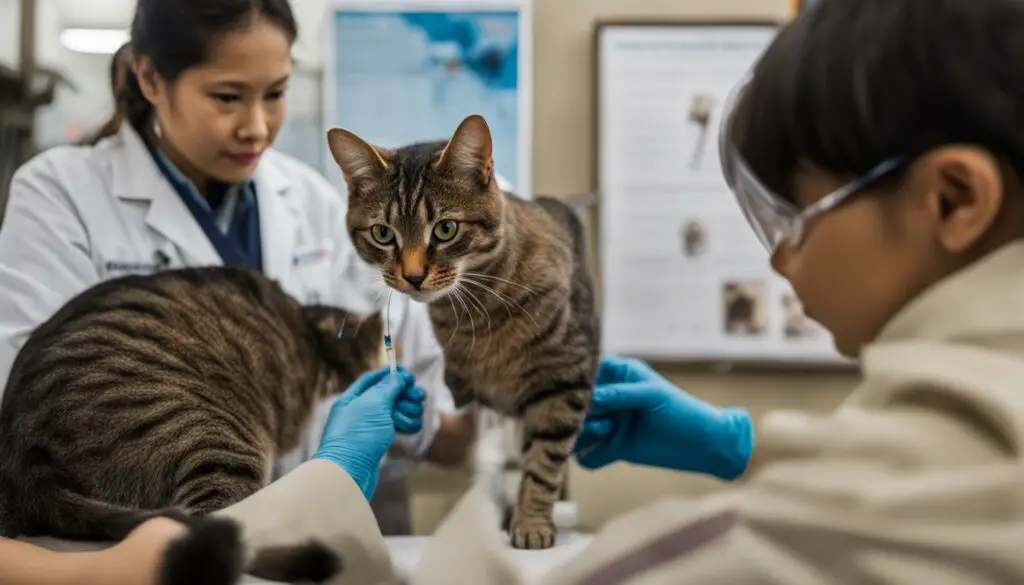
| Vaccination Schedule for Cats | Recommended Timing |
|---|---|
| First Rabies Vaccination | No later than four months after birth |
| Booster Shots | Within one year of initial vaccination, then every 1-3 years depending on local regulations |
Potential Risks of Unvaccinated Cats and Rabies
Unvaccinated cats pose serious risks not only to themselves but also to humans if they bite someone. Rabies is a highly contagious viral disease that affects the central nervous system and is transmitted through the saliva of infected animals. If a cat bites a person and there is a concern of potential rabies infection, immediate medical attention is crucial. Without a valid rabies vaccination, the cat may need to be euthanized or undergo confinement and observation for ten days to determine if it is infected.
Rabies is a deadly disease that can be transmitted from animals to humans, resulting in serious illness or even death. The consequences of a cat biting someone without a rabies shot are severe, as humans are susceptible to rabies infection. If an unvaccinated cat bites someone, the individual may need to undergo extensive medical treatment, including rabies post-exposure prophylaxis, which involves a series of vaccinations and immunoglobulin injections. The potential human rabies infection from an unvaccinated cat bite is a serious concern and should not be taken lightly.
| Risks of Unvaccinated Cats and Rabies: | Consequences of Cat Biting Without Rabies Shot: | Unvaccinated Cat and Human Rabies Infection: |
|---|---|---|
| Increased risk of contracting rabies | Potential transmission of rabies to humans | Rabies virus can infect humans through cat bites |
| Possible euthanasia or confinement for the cat | Extensive medical treatment for the individual | Rabies post-exposure prophylaxis may be necessary |
| Higher likelihood of spreading rabies to other animals | Emotional and physical trauma for the person bitten | Significant health risks and potential death for humans |
It is crucial to keep cats up to date on their rabies vaccinations to prevent the transmission of the disease to humans and other animals. Regular vaccination not only protects the cat but also helps to maintain public health and safety. By ensuring that all cats are properly vaccinated, we can reduce the risks associated with unvaccinated cats and minimize the potential consequences of cat biting incidents. Prevention is key when it comes to rabies, and vaccination is the most effective way to safeguard both our feline companions and the people around them.
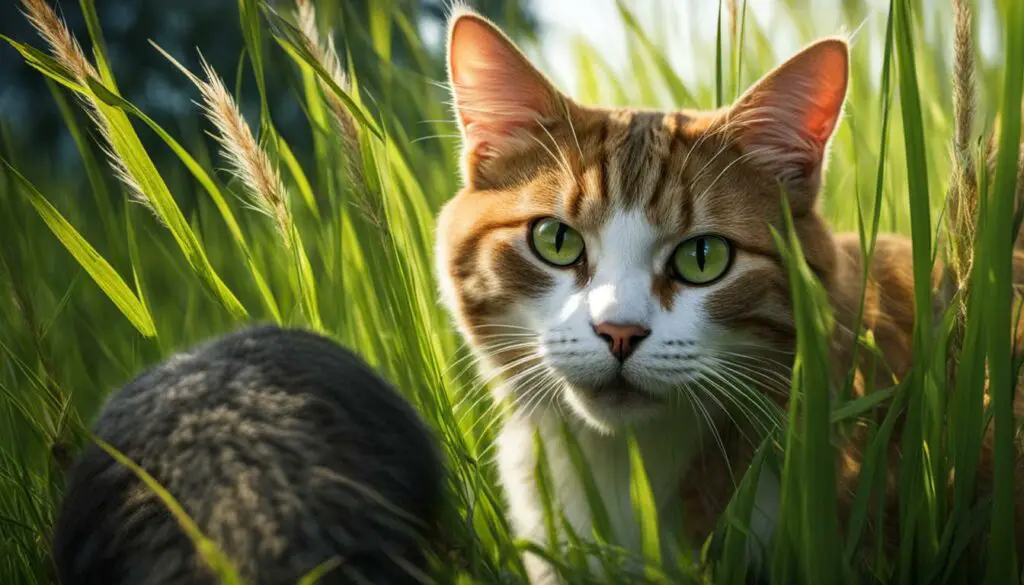
Understanding Rabies and its Transmission
When it comes to understanding rabies in cats, it is important to grasp how the virus spreads in animals and the specific mode of transmission through bites. Rabies is a viral disease that affects the central nervous system of mammals, including cats and humans. Once an animal is infected with the rabies virus, it replicates in the muscles and then moves along the peripheral nerves towards the brain, where it causes severe inflammation.
Rabies is primarily transmitted through the bite of an infected animal. The virus is present in the saliva of the infected animal and can enter the body through broken skin or mucous membranes. While wild animals such as bats, raccoons, skunks, and foxes are commonly associated with rabies, it is crucial to understand that any mammal can be susceptible to the virus. Therefore, it is important to take precautions and prevent contact between cats and potentially rabid animals.
To protect both cats and humans from rabies, it is essential to vaccinate cats against the disease. By ensuring that your cat receives regular rabies vaccinations, you can significantly reduce the risk of transmission and keep your feline companion safe. Remember that rabies is a serious disease that is almost always fatal once symptoms develop, making prevention through vaccination the best course of action.
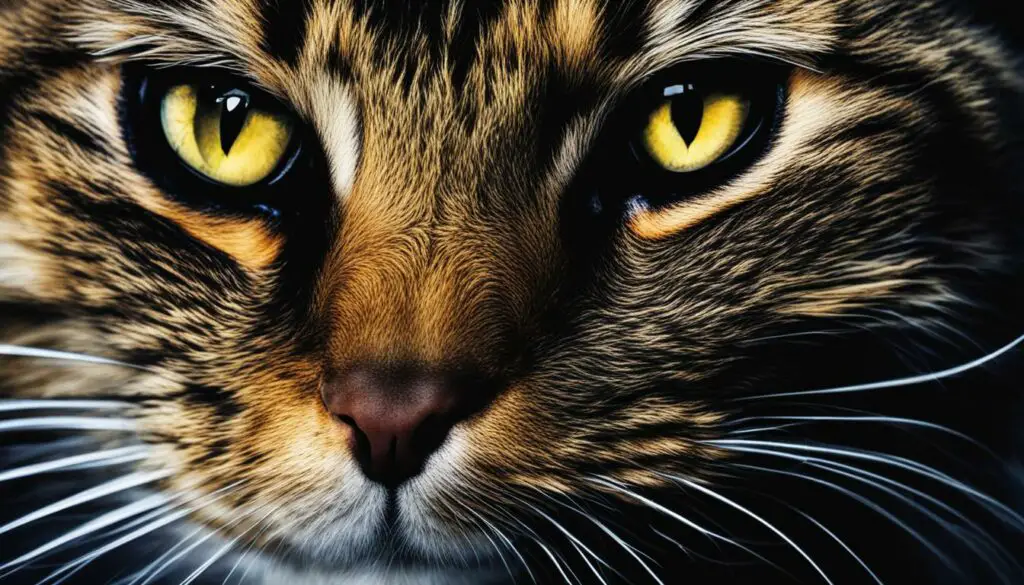
| Rabies Transmission in Cats | Prevention Measures |
|---|---|
| Rabies is spread through bites from infected animals, including wild animals like bats, raccoons, skunks, and foxes. | Vaccinate your cat against rabies as per the recommended schedule provided by your veterinarian. Keep your cat’s vaccinations up to date to ensure protection. |
| Once the rabies virus enters the body, it travels along the peripheral nerves to the central nervous system, causing severe inflammation in the brain. | Avoid allowing your cat to roam freely outdoors and prevent contact with potentially rabid animals. Keep your cat indoors or supervise outdoor activities. |
| Any mammal can be susceptible to the rabies virus, emphasizing the importance of vaccination for all pets, including cats. | Report any unusual behavior or signs of illness in wildlife to local animal control authorities. This can help prevent the spread of rabies in your community. |
Importance of Rabies Vaccination for Indoor Cats
As cat owners, we may assume that indoor cats are safe from exposure to rabies. However, it is important to recognize that even indoor cats can accidentally come into contact with animals carrying the rabies virus. This makes it crucial to prioritize rabies vaccination for our indoor feline companions.
While the risk of exposure for indoor cats may be lower compared to their outdoor counterparts, accidents can happen. Cats can escape through open doors or windows, encounter bats or other wild animals that have made their way indoors, or even be exposed to rabies through contact with infected animals outside the home. Rabies is a deadly disease that affects both animals and humans, and the consequences can be devastating.
To prevent accidental exposure and ensure the well-being of our indoor cats, it is essential to keep their rabies vaccinations up to date. By staying proactive and adhering to the recommended vaccination schedule, we can minimize the risk of our beloved feline companions contracting this life-threatening disease.

Risks of Rabies Exposure for Indoor Cats
While indoor cats may have limited interaction with potential rabies carriers, it is crucial to recognize that bats, the primary carriers of rabies, can enter homes and pose a significant risk. Bats can squeeze through small cracks and openings, making it possible for them to enter houses undetected. If our indoor cats come into contact with a bat carrying the rabies virus, they can become infected.
It is essential to understand that rabies is a highly contagious viral disease that affects the central nervous system. Once symptoms manifest, the disease is almost always fatal. By vaccinating our indoor cats against rabies, we are taking a proactive step in protecting them from unnecessary suffering and potentially saving their lives.
Preventing Rabies in Indoor Cats
Preventing rabies in indoor cats starts with ensuring that they receive the proper vaccination. Consult with your veterinarian to determine the appropriate vaccination schedule for your cat based on their age, health status, and local regulations. Maintaining regular booster shots will help to ensure their continued immunity against the rabies virus.
Additionally, it is crucial to take steps to reduce the chances of accidental exposure. Seal any potential entry points in your home that may allow bats or other animals to enter. Keep windows and doors closed or fitted with appropriate screens. It is also essential to practice caution when bringing new pets or animals into the home, ensuring that they are properly vaccinated and free from any infectious diseases.
| Benefits of Rabies Vaccination for Indoor Cats | Risks of Rabies Exposure for Indoor Cats |
|---|---|
| – Protection against fatal disease | – Potential transmission from bats or other infected animals |
| – Peace of mind for cat owners | – Possibility of accidental escape from the home |
| – Compliance with local vaccination requirements | – Accidental contact with infected animals brought inside |
| – Prevention of transmission to humans | – Limited but potential risk within the home |
Rabies Vaccination Schedule for Kittens and Booster Shots
When it comes to protecting our kittens from rabies, following a proper vaccination schedule is crucial. Vaccinations help to prevent the spread of this deadly disease and ensure the health and safety of our feline companions. Here is an overview of the rabies vaccination schedule for kittens and the frequency of booster shots in cats.
Table: Rabies Vaccination Schedule
| Age of Kitten | Rabies Vaccine |
|---|---|
| 3-4 months | First rabies vaccination |
| 1 year | Booster shot |
| Every 1-3 years | Subsequent booster shots |
Typically, kittens receive their first rabies vaccination when they are around three to four months old. This initial vaccine helps to stimulate their immune system and protect them from the rabies virus. After the first vaccination, booster shots are generally recommended every one to three years, depending on veterinarian guidance and legal requirements.
Booster shots play a crucial role in maintaining a cat’s immunity against rabies. These follow-up vaccinations reinforce the cat’s defenses and ensure that they remain protected throughout their lives. By adhering to the recommended vaccination schedule, we can minimize the risk of our cats contracting rabies and help prevent the spread of this dangerous disease.
It is essential to consult with your veterinarian to determine the appropriate vaccination schedule for your cat. Your veterinarian can provide personalized guidance based on your cat’s health, lifestyle, and local regulations. Remember, ensuring your cat’s regular vaccinations, including rabies shots, is vital for their well-being and the safety of your household.
Exemptions and Approval for Rabies Vaccination
While rabies vaccination is required for all cats in most states and counties, there are exemptions available for certain cats if the vaccine would adversely affect their health. These exemptions aim to ensure the well-being of cats while also addressing individual health concerns. To qualify for a rabies vaccine exemption, the cat’s veterinarian must document the need for exemption based on the cat’s medical history and condition.
In some cases, approval from the local public health authority may be required to grant the exemption. This additional step ensures that exemptions are granted appropriately and in compliance with local regulations that prioritize public health and safety. It is important for cat owners to be aware of the specific requirements and regulations in their location to understand the process and criteria for obtaining a rabies vaccine exemption.
Exemptions for rabies vaccination in cats are granted to protect the health and well-being of cats while considering their individual circumstances. By working closely with their veterinarian and local authorities, cat owners can navigate the process of obtaining an exemption and provide their cats with the necessary care while adhering to legal requirements.

Summary:
In certain circumstances, cats may be exempted from receiving the rabies vaccination due to health concerns. These exemptions require documentation from the veterinarian and, in some cases, approval from the local public health authority. Exemptions prioritize the well-being of the cat while ensuring compliance with regulations and legal requirements. Cat owners should familiarize themselves with the specific requirements in their area and work closely with their veterinarian to navigate the process of obtaining a rabies vaccine exemption.
Monitoring and Potential Rabies Exposure
After potential exposure to rabies, it is crucial to closely monitor your cat’s health for any signs of infection. Rabies is a serious viral disease that affects the central nervous system, and early detection is key to ensuring your cat receives prompt veterinary care. The duration of monitoring after potential rabies exposure can vary, but it is recommended to observe your cat for up to 45 days.
During the monitoring period, be vigilant for any changes in your cat’s behavior or physical condition. Some common signs of rabies infection in cats include low energy, fever, vomiting, and a decreased appetite. If you notice any of these symptoms, it is important to seek immediate veterinary assistance.
While monitoring your cat, it is essential to prioritize their safety and the safety of those around them. Keep your cat indoors and avoid any unnecessary contact with other animals, especially wildlife. Contact your local animal control centers if you spot any wild animals displaying symptoms of rabies.
Remember, even if your cat’s rabies vaccine status is current, monitoring after potential exposure is still necessary. Stay vigilant, observe any changes in your cat’s health, and seek veterinary care if needed. By taking proactive measures, you can help protect your cat and prevent the spread of rabies to other animals and humans.
| Signs of Rabies Infection in Cats | Duration of Monitoring after Rabies Exposure |
|---|---|
| Low energy | Up to 45 days |
| Fever | |
| Vomiting | |
| Decreased appetite |

“Even if your cat’s rabies vaccine status is current, monitoring after potential exposure is still necessary.”
Taking Action and Finding Resources
If your cat accidentally receives two rabies shots or is potentially exposed to rabies, it is important to take immediate action to ensure their health and well-being. Here are some steps you can take:
- Contact your veterinarian: Reach out to your veterinarian as soon as possible. They will be able to provide guidance on how to proceed and may suggest bringing your cat in for an examination.
- Seek emergency cat care: If your cat is experiencing severe reactions or symptoms, such as difficulty breathing or anaphylactic shock, it is important to seek emergency cat care immediately. This may involve contacting a nearby emergency veterinary hospital or clinic.
- Low-cost clinics: If you are concerned about the cost of veterinary care, you can look into low-cost clinics in your area. These clinics often provide affordable vaccination services and can help address any concerns related to double rabies shots or potential exposure.
Remember, swift action is crucial when it comes to potential rabies exposure or accidental double vaccinations. Contacting your veterinarian, seeking emergency care when necessary, and exploring low-cost clinic options can help ensure the best possible outcome for your cat.
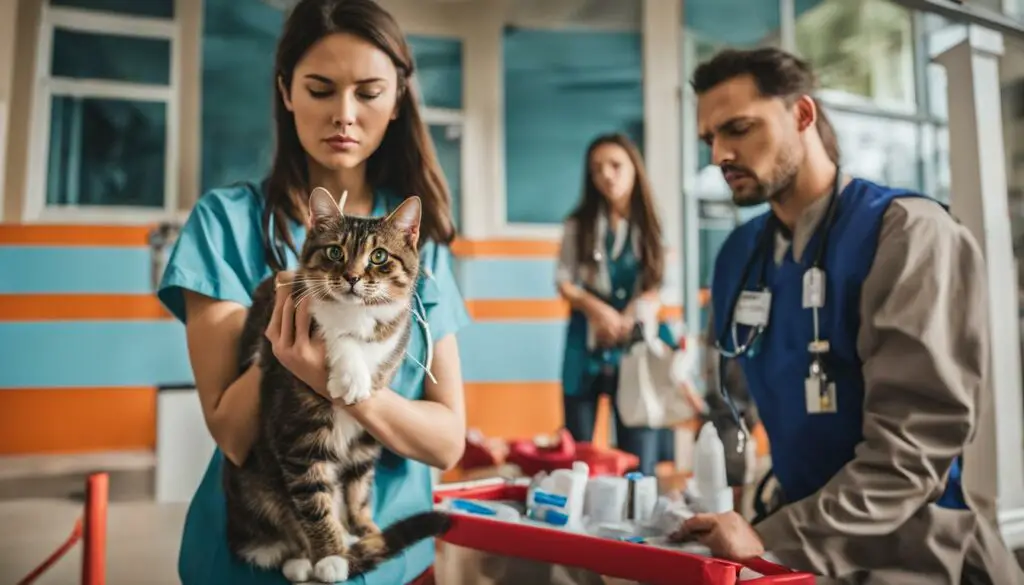
Personal Story and Importance of Rabies Prevention
Let me share a personal experience that emphasizes the importance of preventing rabies in cats. A few years ago, my beloved cat, Luna, accidentally received double rabies shots due to a mix-up at the veterinary clinic. At first, I was worried about the potential consequences and the impact it could have on Luna’s health.
Fortunately, Luna only experienced mild reactions to the double vaccination. She had some discomfort at the injection site and showed signs of lethargy for a couple of days. However, it was a valuable lesson for me about the significance of keeping up-to-date on rabies vaccinations and preventing potential risks.
This incident reminded me of the critical role that rabies prevention plays in ensuring the well-being of our feline companions. Rabies is a deadly disease that can be transmitted to humans and other animals through bites or scratches from infected animals. By maintaining regular rabies vaccinations for our cats, we not only protect their lives but also contribute to the overall public health and safety of our communities.

As responsible cat owners, it is our duty to prioritize the prevention of rabies. Regular veterinary check-ups, adhering to the recommended vaccination schedule, and keeping our cats’ vaccinations up to date are crucial steps in this process. By taking these measures, we can help create a safer environment for our furry friends and reduce the risk of the disease spreading to humans.
Resources and Additional Information
When it comes to cat care and rabies prevention, there are various resources available to help you ensure the health and well-being of your feline companion. Whether you need emergency cat care or want to stay informed on cat health and care, these resources can provide valuable assistance.
One option is to reach out to local animal control centers. They can provide guidance on finding emergency cat care services in your area and offer advice on what steps to take if your cat has potentially been exposed to rabies.
Another valuable resource is low-cost clinics. These clinics often offer affordable vaccinations, including rabies vaccines, to help ensure that all cats have access to vital preventive care. They can also provide information on local rabies vaccination requirements and schedules.
“Staying informed about cat health and rabies prevention is essential for every cat owner. Regular check-ups, vaccinations, and awareness of potential risks can help safeguard your cat’s well-being. “
In addition to these resources, staying informed is key. Subscribe to cat health blogs and newsletters to receive the latest information on caring for your cat. These resources can provide tips, advice, and updates on vaccinations, symptoms to watch for, and other important aspects of cat health and care.
By utilizing these resources and staying proactive in your cat’s care, you can help ensure that your feline companion remains healthy and protected against diseases like rabies.
| Resources | Description |
|---|---|
| Local Animal Control Centers | Provide guidance on emergency cat care and potential rabies exposure |
| Low-Cost Clinics | Offer affordable vaccinations, including rabies vaccines |
| Cat Health Blogs and Newsletters | Provide valuable information on cat health and care |
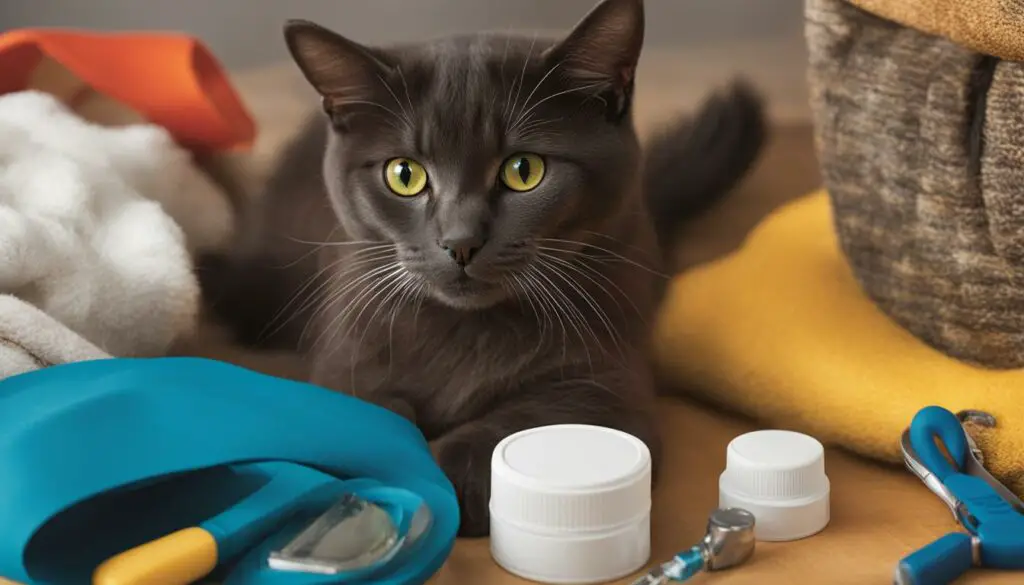
Stay Informed and Caring for Your Cat
As a responsible cat owner, staying informed about your cat’s health and well-being is crucial. Regular check-ups with a veterinarian can help ensure your cat’s overall health and catch any potential issues early on. It’s important to stay updated on vaccinations, including the essential rabies vaccine, to protect your cat from dangerous diseases. During vet visits, take the opportunity to ask questions, seek advice, and discuss any concerns you may have about your cat’s health.
Cat care tips and information can also be found through reputable online resources, such as blogs and newsletters dedicated to feline health. These sources can provide valuable insights on topics ranging from nutrition and exercise to behavior and grooming. Staying informed allows you to make well-informed decisions when it comes to providing the best care for your furry friend.
In addition to regular veterinary care, caring for your cat’s well-being involves creating a safe and stimulating environment. Provide your cat with a balanced diet that meets its nutritional needs, and make sure to provide fresh water at all times. Engage your cat in playtime and provide mental stimulation through interactive toys or games. Regular grooming, including brushing your cat’s fur and keeping their teeth clean, is also essential for their overall health and well-being.
Remember, cats rely on their human caretakers for their health and happiness. By staying informed about cat health, seeking proper veterinary care, and providing a loving and enriching environment, you can ensure your feline companion leads a long, healthy, and fulfilling life.
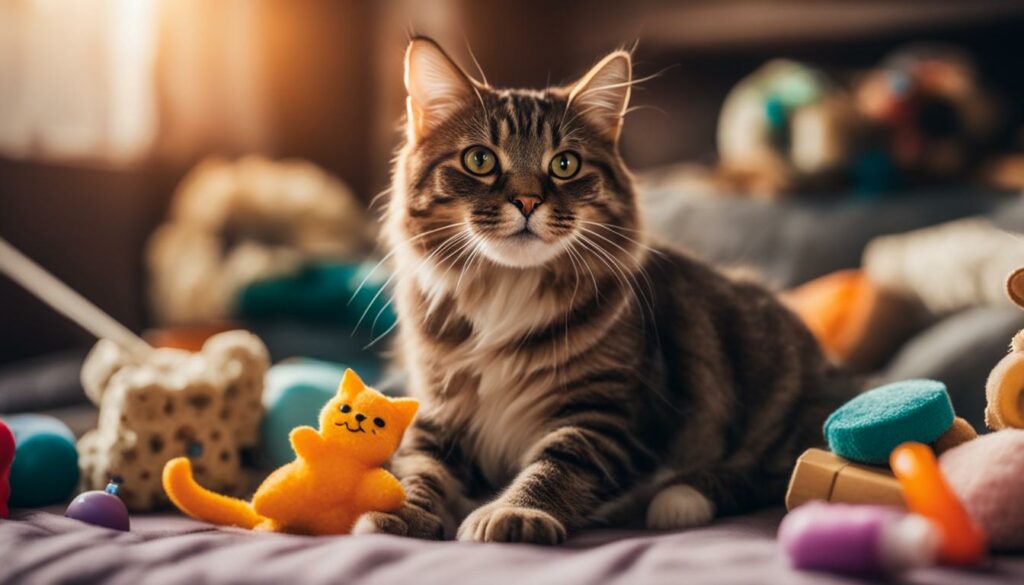
Tips for Cat Care:
- Ensure regular veterinary check-ups for vaccinations and overall health assessments.
- Seek advice and information from reputable online resources dedicated to cat care.
- Provide a balanced diet and fresh water for your cat’s nutritional needs.
- Engage your cat in playtime and provide mental stimulation with interactive toys.
- Regularly groom your cat to keep their fur and teeth healthy.
“Cats rely on their human caretakers for their health and happiness.”
By following these tips and staying proactive in caring for your cat, you can ensure a happy and healthy life for your feline companion.
Conclusion
In conclusion, if your cat accidentally receives two rabies shots, it can potentially experience mild to severe reactions. It is important to be aware of the signs of a mild reaction or allergy, such as vomiting, swelling at the injection site, and low-grade fever. Serious reactions, including the development of cancerous tumors and organ damage, require immediate veterinary care.
Rabies vaccination is crucial for all cats, whether they are indoor or outdoor. Unvaccinated cats pose risks not only to themselves but also to humans if they bite someone. Keeping your cat up to date on their rabies vaccinations is essential to prevent the transmission of the disease.
Remember to follow the recommended vaccination schedule for kittens and administer booster shots as advised by your veterinarian. In some cases, exemptions may be granted for cats if the rabies vaccine would adversely affect their health, but it is important to check the specific requirements and regulations in your location.
By prioritizing rabies prevention in cats, monitoring them after potential exposure, and taking immediate action when necessary, we can ensure the well-being of our feline companions and protect ourselves and others from the risks associated with this dangerous disease.
FAQ
What should I do if my cat accidentally receives two rabies shots?
If your cat accidentally receives two rabies shots, it is important to monitor them for any signs of a reaction. Mild signs may include vomiting, swelling at the injection site, fever, diarrhea, and lethargy. Serious reactions can include the development of a cancerous tumor at the injection site, organ damage, and anaphylactic shock. Contact your veterinarian for immediate care and guidance.
What are the signs of a mild reaction or allergy to the rabies vaccine in cats?
Signs of a mild reaction or allergy to the rabies vaccine in cats may include vomiting, swelling at the injection site, pain at or near the injection site, low-grade fever, diarrhea, appetite loss, lethargy, itching, and sneezing.
What are the signs of a serious reaction to the rabies vaccine in cats?
Signs of a serious reaction to the rabies vaccine in cats can include the development of a cancerous tumor at the injection site (Vaccine Associated Fibrosarcoma), organ damage to the kidneys, liver, or central nervous system, and anaphylactic shock. These reactions may require immediate veterinary intervention and treatment.
What are the requirements for rabies vaccination in cats?
Rabies vaccination is required for all cats in most states and counties. The first rabies vaccination should be given no later than four months after the cat’s date of birth. Booster shots are typically given within one year of the initial vaccination and can last for three years. Some areas may offer exemptions for cats if the vaccine would adversely affect their health.
What are the risks of unvaccinated cats and rabies?
Unvaccinated cats pose serious risks not only to themselves but also to humans if they bite someone. If a cat bites a person and there is a concern of potential rabies infection, the cat may need to be euthanized or undergo confinement and observation for ten days. Keeping cats up to date on their rabies vaccinations helps prevent the transmission of the disease to humans and other animals.
How is rabies transmitted and who is susceptible to the disease?
Rabies is a viral disease that affects the central nervous system of mammals, including cats and humans. It is primarily transmitted through the bite of a rabid animal. While wild animals like bats, raccoons, skunks, and foxes are commonly associated with rabies, any mammal can be susceptible.
Why is rabies vaccination important for indoor cats?
Even for indoor cats, rabies vaccination is crucial. There are instances where indoor cats may accidentally escape or encounter animals carrying rabies, putting them at risk of exposure. Keeping their rabies vaccinations up to date helps protect both the cat and potential human interactions.
What is the vaccination schedule for kittens and booster shots?
Kittens typically receive their first rabies vaccination around three to four months of age. Booster shots are generally administered every year or up to every three years based on veterinarian guidance and legal requirements. Consult with your veterinarian to determine the appropriate vaccination schedule for your cat.
Are there exemptions and approval for rabies vaccination in cats?
In some areas, exemptions may be granted for cats if the rabies vaccine would adversely affect their health. The cat’s veterinarian can document the need for an exemption, and in some cases, approval may be required by the local public health authority. Check the specific requirements and regulations in your location.
How long should I monitor my cat after potential rabies exposure?
Even if a cat’s rabies vaccine status is current, it is recommended to monitor them for up to 45 days after potential rabies exposure. The first symptoms of rabies may include low energy, fever, vomiting, and low appetite. If any signs or symptoms of rabies infection occur, immediate veterinary care should be sought.
What should I do if my cat accidentally receives two rabies shots or is potentially exposed to rabies?
If your cat accidentally receives two rabies shots or is potentially exposed to rabies, it is important to take action. Resources such as emergency cat care and low-cost clinics can provide the necessary care and assistance. Contact local animal control centers if you spot wild animals displaying rabies symptoms.
Is there a personal story highlighting the importance of rabies prevention?
Yes, a personal story about a cat owner’s experience with their cats encountering a bat highlights the importance of maintaining up-to-date rabies vaccinations for all cats, regardless of whether they are indoor or outdoor. This anecdote serves as a reminder to never let boosters lapse and to prioritize the prevention of rabies in cats.
Where can I find resources and additional information on cat care and rabies prevention?
Various resources and information are available for cat care and rabies prevention. These include emergency cat care options, low-cost clinics, and local animal control centers. Staying informed on cat health and care through blogs and newsletters can also help ensure the well-being of your cat companion.
How can I stay informed and properly care for my cat?
It is essential to stay informed about cat health and continuously prioritize their well-being. Regular veterinary check-ups, vaccinations, and being aware of potential risks and symptoms can help maintain your cat’s health. Caring for your cat involves providing proper nutrition, exercise, and a safe environment.
What is the importance of rabies prevention in cats?
Rabies prevention should be a priority for all cat owners. Accidentally receiving two rabies shots can lead to mild to severe reactions in cats, which may require veterinary intervention. Additionally, keeping cats up to date on their rabies vaccinations helps prevent the transmission of the disease to humans and other animals.

